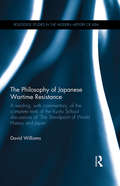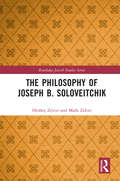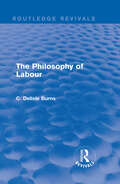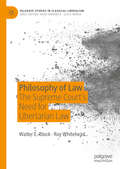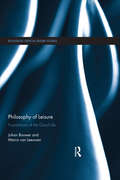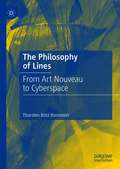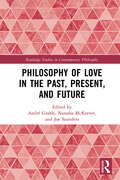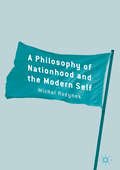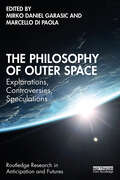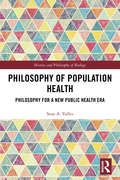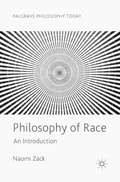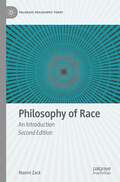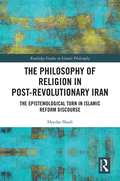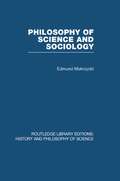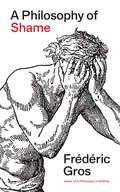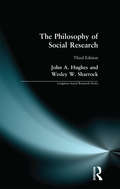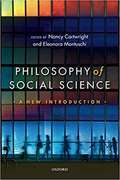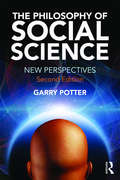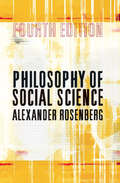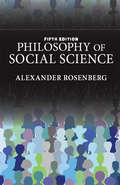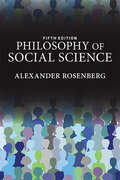- Table View
- List View
The Philosophy of Japanese Wartime Resistance: A reading, with commentary, of the complete texts of the Kyoto School discussions of "The Standpoint of World History and Japan" (Routledge Studies in the Modern History of Asia)
by David WilliamsThe transcripts of the three Kyoto School roundtable discussions of the theme of ‘the standpoint of world history and Japan’ may now be judged to form the key source text of responsible Pacific War revisionism. Published in the pages of Chuo Koron, the influential magazine of enlightened elite Japanese opinion during the twelve months after Pearl Harbor, these subversive discussions involved four of the finest minds of the second generation of the Kyoto School of philosophy. Tainted by controversy and shrouded in conspiratorial mystery, these transcripts were never republished in Japan after the war, and they have never been translated into English except in selective and often highly biased form. David Williams has now produced the first objective, balanced and close interpretative reading of these three discussions in their entirety since 1943. This version of the wartime Kyoto School transcripts is neither a translation nor a paraphrase but a fuller rendering in reader-friendly English that is convincingly faithful to the spirit of the original texts. The result is a masterpiece of interpretation and inter-cultural understanding between the Confucian East and the liberal West. Seventy years after Tojo came to power, these documents of the Japanese resistance to his wartime government and policies exercise a unique claim on students of Japanese history and thought today because of their unrivalled revelatory potential within the vast literature on the Pacific War. The Philosophy of Japanese Wartime Resistance may therefore stand as the most trenchant analysis of the political, philosophic and legal foundations of the place of the Pacific War in modern Japanese history yet to appear in any language.
The Philosophy of Joseph B. Soloveitchik (Routledge Jewish Studies Series)
by Heshey Zelcer Mark ZelcerProviding a concise but comprehensive overview of Joseph B. Soloveitchik’s larger philosophical program, this book studies one of the most important modern Orthodox Jewish thinkers. It incorporates much relevant biographical, philosophical, religious, legal, and historical background so that the content and difficult philosophical concepts are easily accessible. The volume describes his view of Jewish law (Halakhah) and how he takes the view to answer the fundamental question of Jewish philosophy, the question of the "reasons" for the commandments. It shows how numerous of his disparate books, essays, and lectures on law, specific commandments, and Jewish religious phenomenology, can be woven together to form an elegant philosophical program. It also provides an analysis and summary of Soloveitchik’s views on Zionism and on interreligious dialogue and the contexts for Soloveitchik’s respective stances on two issues that were pressing in his role as a leader of a major branch of post-war Orthodox Judaism. The book provides a synoptic overview of the philosophical works of Joseph B. Soloveitchik. It will be of interest to historians and scholars studying neo-Kantian philosophy, Jewish thought and philosophy of religion.
The Philosophy of Labour (Routledge Revivals)
by C. Delisle BurnsOriginally published in 1925, C. Delisle Burns’ The Philosophy of Labour attempts to lay down key aspects of labour and the working class of that time period, covering aspects such as economic obstacles, standards of living and patriotism. Burns does not draw on past philosophers or sociological thinkers of the working-class and instead chose to focus only on the attitude of the workers in factories, mines, roads, railways and other forms of manual labour. This title will be of interest to students of philosophy.
Philosophy of Law: The Supreme Court’s Need for Libertarian Law (Palgrave Studies in Classical Liberalism)
by Walter E. Block Roy WhiteheadLooking at discrimination, education, environment, health and crime, this volume analyses United States Supreme Court rulings on several legal issues and proposed libertarian solutions to each problem. Setting their own liberal theory of law, each chapter discusses the law at hand, what it should be, and what it would be if their political economic philosophy were the justification of the legal practice. Covering issues such as sexual harassment, religion, markets in human organs, drug prohibition and abortion, this book is a timely contribution to classical liberal debate on law and economics.
Philosophy of Leisure: Foundations of the good life (Routledge Critical Leisure Studies)
by Johan Bouwer Marco van LeeuwenWhat is leisure? How does leisure relate to leading a good life? This critical and intelligent study interrogates the basic principles of leisure and demonstrates the continuing relevance of these questions for our society today. It not only explores the traditional philosophical concepts at the heart of leisure studies, but also pursues new possibilities for reconceptualising leisure that have emerged from recent developments in society, technology and the broader discipline of philosophy itself. Approaching leisure from a philosophically inquisitive perspective, the book argues that leisure revolves around the pursuit of happiness, human flourishing and well-being, making it both a state of mind and a state of being. Its exploration of the meaning of leisure addresses key issues such as identity, ethics, spirituality, human experience, freedom, technology, embodiment, well-being, the fundamental properties of leisure and the challenge of offering a meaningful definition. Revitalising the subject of leisure studies with its originality, Philosophy of Leisure: Foundations of the Good Life is fascinating reading for all students and scholars of leisure studies, philosophy, sociology, psychology and ethics.
The Philosophy of Lines: From Art Nouveau to Cyberspace
by Thorsten Botz-BornsteinThis book offers a philosophical exploration of lines in art and culture, and traces their history from Antiquity onwards. Lines can be physical phenomena, cognitive responses to observed processes, or both at the same time. Based on this assumption, the book describes the “philosophy of lines” in art, architecture, and science. The book compares Western and Eastern traditions. It examines lines in the works of Paul Klee, Wassily Kandinsky, and Henri Michaux, as well as in Chinese and Japanese art and calligraphy. Lines are not merely a matter of aesthetics but also reflect the psychological states of entire cultures. In the nineteenth century, non-Euclidean geometry sparked the phenomenon of the “self-negating line,” which influenced modern art; it also prepared the ground for virtual reality. Straight lines, distorted lines, blurred lines, hot and cold lines, dynamic lines, lines of force, virtual lines, and on and on, lines narrate the development of human civilization.
Philosophy of Love in the Past, Present, and Future (Routledge Studies in Contemporary Philosophy)
by André GrahleThis volume features original essays on the philosophy of love. The essays are organized thematically around the past, present, and future of philosophical thinking about love. In Part I, the contributors explore what we can learn from the history of philosophical thinking about love. The chapters cover Ancient Greek thinkers, namely Plato and Aristotle, as well as Kierkegaard’s critique of preferential love and Erich Fromm’s mystic interpretation of sexual relations. Part II covers current conceptions and practices of love. These chapters explore how love changes over time, the process of falling in love, the erotic dimension of romantic love, and a new interpretation of grand-parental love. Finally, Part III looks at the future of love. These chapters address technological developments related to love, such as algorithm-driven dating apps and robotic companions, as well as the potential of polyamory as a future romantic ideal. This book will be of interest to researchers and advanced students in moral philosophy and social and political philosophy who are working on issues related to the philosophy of love.
The Philosophy of Movement: An Introduction
by Thomas NailAn influential thinker distills years of work on the philosophy of movement into one accessible account Why are city dwellers worldwide walking on average ten percent faster than they were a decade ago? Why are newcomer immigrant groups so often maligned when migration has always constituted civilization? To analyze and understand the depth of the reasons, Thomas Nail suggests that it serves us well to turn to a philosophy of movement. Synthesizing and extending many years of his influential work, The Philosophy of Movement is a comprehensive argument for how motion is the primary force in human and natural history. Nail critiques the bias toward stasis at the core of Western thought, asking: what would a philosophy that began with the primacy of movement look like? Interrogating the consequences of movement throughout history and in daily life in the twenty-first century, he draws connections and traces patterns between scales of reality, periods of history, and fields of knowledge. In our age of rapid movements shaped by accelerating climate change and ensuing mass global migration, as well as ubiquitous digital media, Nail provides a contemporary philosophy that helps us understand how we got here and how to grapple with these interlocking challenges. With a foreword by philosopher Daniel W. Smith, The Philosophy of Movement: An Introduction is a must-read for scholars and students not only of philosophy but also history, anthropology, science and technology studies, mobility studies, and other fields across the humanities and social sciences.
A Philosophy of Nationhood and the Modern Self
by Michal RozynekThis book delves into the philosophical presuppositions of modern political agency. Michal Rozynek explores the place of nationalism in an increasingly cosmopolitan world by approaching the fundamental questions of modern subjectivity from a new angle. Taking as a starting point the transformations of the modern self, this volume argues that the project of modernity leads to an unresolvable tension within the self-- one which seemingly jeopardizes our ability to participate in a public world. Rozynek goes on to show how nationhood can offer a resolution to this tension, building on the pioneering work of Liah Greenfeld. Far from being a defense of tribalism, this book attempts to tackle both the questions of national solidarity and cosmopolitan duties, by problematizing the account of nationalism in contemporary political theory and advocating a revised model of universalism.
The Philosophy of Outer Space: Explorations, Controversies, Speculations (Routledge Research in Anticipation and Futures)
by Mirko Daniel Garasic Marcello Di PaolaThis volume provides a rigorous philosophical investigation of the rationales, challenges, and promises of the coming Space Age.Over the past decade, space exploration has made significant and accelerating progress, and its potential has attracted growing attention from science, states, businesses, innovators, as well as the media and society more generally. Yet philosophical theorizing concerning the premises, values, meanings, and impacts of space exploration is still in its infancy, and this potentially immense field of study is far from mainstream yet. This book advances outer space philosophy by integrating key scientific and societal debates sparked by recent developments in space research and activities with conceptual, existential, ethical, aesthetic, and political themes and concerns. It maps various regions of philosophical exploration, reflection, and speculation regarding humanity’s present and future emanations into outer space, to promote a broad, rich, and nuanced societal debate regarding this transformative enterprise, which is as stimulating as it can be disorienting.This book will be a fascinating read for academics, researchers, and students interested in philosophy, space studies, science and technology studies, future studies, and sustainability.
Philosophy of Population Health: Philosophy for a New Public Health Era (History and Philosophy of Biology)
by Sean A VallesPopulation health has recently grown from a series of loosely connected critiques of twentieth-century public health and medicine into a theoretical framework with a corresponding field of research—population health science. Its approach is to promote the public’s health through improving everyday human life: afford-able nutritious food, clean air, safe places where children can play, living wages, etc. It recognizes that addressing contemporary health challenges such as the prevalence of type 2 diabetes will take much more than good hospitals and public health departments. Blending philosophy of science/medicine, public health ethics and history, this book offers a framework that explains, analyses and largely endorses the features that define this relatively new field. Presenting a philosophical perspective, Valles helps to clarify what these features are and why they matter, including: searching for health’s "upstream" causes in social life, embracing a professional commitment to studying and ameliorating the staggering health inequities in and between populations; and reforming scientific practices to foster humility and respect among the many scientists and non- scientists who must work collaboratively to promote health. Featuring illustrative case studies from around the globe at the end of all main chapters, this radical monograph is written to be accessible to all scholars and advanced students who have an interest in health—from public health students to professional philosophers.
Philosophy of Race: Equality After The History Of Philosophy (Palgrave Philosophy Today)
by Naomi ZackPhilosophy of Race: An Introduction provides plainly written access to a new subfield that has been in the background of philosophy since Plato and Aristotle. Part I provides an overview of ideas of race and ethnicity in the philosophical canon, egalitarian traditions, race in biology, and race in American and Continental Philosophy. Part II addresses race as it operates in life through colonialism and development, social constructions and institutions, racism, political philosophy, and gender. This book constructs an outline that will serve as a resource for students, nonspecialists, and general readers in thinking, talking, and writing about philosophy of race.
Philosophy of Race: An Introduction (Palgrave Philosophy Today)
by Naomi ZackPhilosophy of Race: An Introduction provides plainly written access to a new subfield that has been in the background of philosophy since Plato and Aristotle. The second edition is updated to include contemporary developments such as digital racisms, metaphysical othering and metaphysical racism, and the rise of populist movements. Its focus has also been expanded to address non-white racial groups in the Americas, Europe, and beyond, such as the Roma and Uighur people. Part I provides an overview of ideas of race and ethnicity in the philosophical canon, egalitarian traditions, race in biology, and race in American and Continental Philosophy. Part II addresses race as it operates in life through colonialism and development, social constructions and institutions, racism, political philosophy, gender, and populist movements. This book constructs an outline that will serve as a resource for students, nonspecialists, and general readers in thinking, talking, and writing about philosophy of race.
The Philosophy of Religion in Post-Revolutionary Iran: The Epistemological Turn in Islamic Reform Discourse (Routledge Studies in Islamic Philosophy)
by Heydar ShadiThis book explores the intellectual discourse in post-revolutionary Iran. It focuses on Abdolkarim Soroush, a leading Muslim liberal thinker, whose theory of religion is regarded as highly relevant to the current theological and intellectual dynamics in the Islamic world. The Philosophy of Religion in Post-Revolutionary Iran discusses why and how Soroush's thought has developed from an Islamic apologetic modernist theology in the 1970s to a liberal theory about religion in post-revolutionary Iran. Through a close and detailed analysis of Soroush's main theories, the book argues that Soroush's thought evolved, through reception of post-positivist epistemology and interaction with Islamism in practice, into a historicist and pluralist theory of religion, a theory that regards religion, including Islam, as being a contextual and historical dialogue between man and the Absolute. The book also highlights some shortcomings of Soroush’s reform project. Specifically, it notes that Soroush, consciously or unconsciously, has not yet admitted many extensive consequences of his theories, such as those relating to historicity of religious rituals (‘ibadat) or recognition of the post-Mohammadan revelations and religions. In addition, some other features and implications of Soroush’s thought, such as a historical-critical approach to the Koran, post-secular and post-Islamist theologies, and his dialogical approach that goes beyond the Orientalism–Occidentalism dichotomy, are discussed. Providing a detailed overview on this leading Muslim thinker, this book will appeal to students and scholars of Islamic Philosophy, Middle East Studies, and Philosophy of Religion.
Philosophy of Science and Sociology: From the Methodological Doctrine to Research Practice (Routledge Library Editions: History & Philosophy of Science)
by Edmund MokrzyckiOriginally published in 1983. This book concentrates on the impact of philosophy of science on sociology and other disciplines. It argues that the impact of the philosophy of science on sociology from the rise of the Vienna Circle until the mid-1980s resulted in a deep-reaching and, in the author’s view, undesirable methodological reorientation in sociology.
A Philosophy of Shame: A Revolutionary Emotion
by Frédéric GrosAn original reflection on shame as the central feeling of our age — the expression of an anger that is the necessary condition for new strugglesCan shame become a source of political strength? Faced with injustice, growing inequality and systemic violence, we cry out in shame. We feel ashamed of obscene wealth amid wider deprivation. We feel ashamed of humanity for its ruthless and relentless exploitation of the earth. We feel ashamed of the racism and sexism that permeate society and our everyday lives.This difficult emotion is not just sadness or a withdrawal into oneself, nor is it a paralysing sense of inadequacy. As Frédéric Gros argues in A Philosophy of Shame, it arises when our perception of reality rejects passivity and resignation and instead embraces imagination. Shame thus becomes the expression of an anger that is a powerful, transformative force —one that assumes a radical character.In dialogue with authors such as Primo Levi, Annie Ernaux, Virginie Despentes and James Baldwin, Gros explores a concept that is still little understood in its anthropological, moral, psychological and political depths. Shame is a revolutionary sentiment because it lies at the foundation of any path of subjective recognition, transformation and struggle.
The Philosophy of Social Research (Longman Social Research Series)
by John A. Hughes W. W. SharrockThis fully revised, updated and extended edition of a successful text, introduces some of the important philosophical issues arising from social research practices and historical research in the social sciences. Since its initial publication the field of social research and philosophy has been widely debated, and this expanded version incorporates the most recent discussion and theories. In this edition John Hughes and Wes Sharrock carefully analyse the research implications of the great sociological thinkers, and stress that depending upon the researcher's philosophical leanings, there are a range of possible interpretations of the 'facts' uncovered by the researcher.
Philosophy of Social Science: A New Introduction
by Nancy Cartwright Eleanora MontuschiThis is a much-needed new introduction to a field that has been transformed in recent years by exciting new subjects, ideas, and methods. It is designed both for students with central interests in philosophy and those planning to concentrate on the social sciences, and it presupposes no particular background in either domain. From the wide range of topics at the forefront of debate in philosophy of social science, the editors have chosen those which are representative of the most important and interesting contemporary work. A team of distinguished experts explore key aspects of the field such as social ontology (what are the things that social science studies?), objectivity, formal methods, measurement, and causal inference. Also included are chapters focused on notable subjects of social science research, such as well-being and climate change. Philosophy of Social Science provides a clear, accessible, and up-to-date guide to this fascinating field.
The Philosophy of Social Science: An introduction
by Martin HollisThis textbook by Martin Hollis offers an exceptionally clear and concise introduction to the philosophy of social science. It examines questions which give rise to fundamental philosophical issues. Are social structures better conceived of as systems of laws and forces, or as webs of meanings and practices? Is social action better viewed as rational behaviour, or as self-expression? By exploring such questions, the reader is led to reflect upon the nature of scientific method in social science. Is the aim to explain the social world after a manner worked out for the natural world, or to understand the social world from within?
The Philosophy of Social Science: New Perspectives, 2nd edition
by Garry PotterNow in its second edition, this comprehensive textbook offers an exceptionally accessible yet in-depth introduction to the philosophy of social science. Students with no previous knowledge will find themselves taken on an engaging philosophical journey: the book’s unique dialogue format anticipates their most frequently asked questions and provides clear explanations of specialised terminology and essential contextualisation of contemporary debates. Encompassing both traditional and contemporary perspectives, the book explores the questions and debates raised by all the major theoretical positions in the philosophy of social science, including positivism, empiricism, rationalism, hermeneutics, feminist epistemology, postmodernism and critical realism. The first edition of this book had a Eurocentric bias, as does virtually all other textbooks covering this subject matter. This has been corrected in the second edition and includes a new chapter on the contributions of Islam to philosophy, natural science social science including sociology. The second edition also has a newly written chapter on pragmaticism and neo-pragmaticism, as well as strengthened coverage of hermeneutics, postmodernism and critical realism. The book‘s rich pedagogic support includes: point-by-point summaries introducing the scope of every chapter; discussion questions; further reading lists; and a glossary of key terminology. This excellent textbook is designed to provide every student with a clear understanding of important and complex issues. It is essential reading for all students of philosophy of social science, whether at undergraduate or Masters level and regardless of their disciplinary background. ?
Philosophy of Social Science
by Alexander RosenbergPhilosophy of Social Science provides a tightly argued yet accessible introduction to the philosophical foundations of the human sciences, including economics, anthropology, sociology, political science, psychology, history, and the disciplines emerging at the intersections of these subjects with biology. Philosophy is unavoidable for social scientists because the choices they make in answering questions in their disciplines force them to take sides on philosophical matters. Conversely, the social and behavior sciences must inform philosophers’ understanding of human action, norms, and social institutions. The fourth edition retains an illuminating interpretation of the enduring relations between the social sciences and philosophy, and it has now been thoroughly revised to better fit courses, including fifteen chapters, with more effective transitions and helpful summaries. This edition also includes three new chapters on philosophical anthropology, functionalism as a research program, and theories of cultural evolution, as well as enhanced discussions of the role of norms and speech acts in social construction in interpretive social science and a chapter on continental philosophers of social science.
Philosophy of Social Science (Dimensions Of Philosophy Ser.)
by Alexander RosenbergPhilosophy of Social Science provides a tightly argued yet accessible introduction to the philosophical foundations of the human sciences, including economics, anthropology, sociology, political science, psychology, history, and the disciplines emerging at the intersections of these subjects with biology. Philosophy is unavoidable for social scientists because the choices they make in answering questions in their disciplines force them to take sides on philosophical matters. Conversely, the philosophy of social science is equally necessary for philosophers since the social and behavior sciences must inform their understanding of human action, norms, and social institutions.The fifth edition retains from previous editions an illuminating interpretation of the enduring relations between the social sciences and philosophy, and reflects on developments in social research over the past two decades that have informed and renewed debate in the philosophy of social science. An expanded discussion of philosophical anthropology and modern and postmodern critical theory is new for this edition.
Philosophy of Social Science
by Alexander RosenbergRosenberg (philosophy, Duke U. ) introduces students to the philosophical foundations of the human sciences, including economics, anthropology, sociology, political science, psychology, history, and fields at the intersections of these subjects with biology. He discusses the relevance of philosophy, then the problems raised by alternative explanatory strategies, including behaviorism, structuralism, and interpretational theories like critical theory, as well as the relationship between social sciences and moral philosophy. Reorganized into 15 chapters, this edition has new chapters on philosophical anthropology, functionalism as a research program, and theories of cultural evolution; more on the role of norms and speech acts in social construction, including the work of John Searle; more on interpretive social science and continental philosophers with an expanded discussion of the critical theories of those such as Habermas, Foucault, and Bourdieu; new discussion of the role of models and equilibrium explanations in economics and the problem of spontaneous order in the creation of institutions; more on invisible hand explanations and rational choice theory in economics and political science; and an overview of Sen's capacities alternative to utilitarianism and Rawls' and other theories of development. Annotation ©2012 Book News, Inc. , Portland, OR (booknews. com)
Philosophy of Social Science
by Alexander RosenbergPhilosophy of Social Science provides a tightly argued yet accessible introduction to the philosophical foundations of the human sciences, including economics, anthropology, sociology, political science, psychology, history, and the disciplines emerging at the intersections of these subjects with biology. Philosophy is unavoidable for social scientists because the choices they make in answering questions in their disciplines force them to take sides on philosophical matters. Conversely, the social and behavior sciences must inform philosophers' understanding of human action, norms, and social institutions. The fourth edition retains an illuminating interpretation of the enduring relations between the social sciences and philosophy, and it has now been thoroughly revised to better fit courses, including fifteen chapters, with more effective transitions and helpful summaries. This edition also includes three new chapters on philosophical anthropology, functionalism as a research program, and theories of cultural evolution, as well as enhanced discussions of the role of norms and speech acts in social construction in interpretive social science and a chapter on continental philosophers of social science.
Philosophy of Social Science, Fifth Edition
by Alexander RosenbergPhilosophy of Social Science provides a tightly argued yet accessible introduction to the philosophical foundations of the human sciences, including economics, anthropology, sociology, political science, psychology, history, and the disciplines emerging at the intersections of these subjects with biology. Philosophy is unavoidable for social scientists because the choices they make in answering questions in their disciplines force them to take sides on philosophical matters. Conversely, the philosophy of social science is equally necessary for philosophers since the social and behavior sciences must inform their understanding of human action, norms, and social institutions. The fifth edition retains from previous editions an illuminating interpretation of the enduring relations between the social sciences and philosophy, and reflects on developments in social research over the past two decades that have informed and renewed debate in the philosophy of social science. An expanded discussion of philosophical anthropology and modern and postmodern critical theory is new for this edition.
